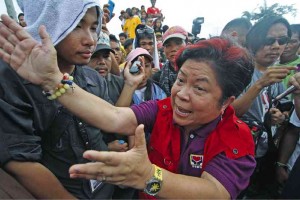BAGUIO CITY—Rosalina Caya-os, 44, a mother of five, had been certain she needed to learn livelihood skills long before she was listed as a beneficiary in the government’s conditional cash transfer (CCT) program.
She volunteered to undergo training when the Department of Social Welfare and Development (DSWD) implemented a rehabilitation program for Baguio City’s “street walkers of Magsaysay District.”
Social Welfare Secretary Corazon Soliman said Caya-os’ determination to succeed proves that it is the individual’s choices and decisions that determine the efficacy of government assistance. Her case also disproves claims made by critics that the CCT program fosters laziness among the recipients, Soliman said.
“A family will not survive if they rely solely on the nominal amount being given at P1,400 a month,” she said. The program, she added, intends to keep poor families afloat by augmenting their nutrition, health and education expenses.
Soliman spent Women’s International Day here on Friday speaking to beneficiaries of the CCT program whom she described as “women who are determined to survive.”
“The Magsaysay Express girls were still active in those days. They were given livelihood training and because I did not know how to cook, I joined their training classes,” said Caya-os, a leader at Barangay (village) San Carlos Heights, one of the participating villages here in the Pantawid Pamilyang Pilipino program.
The DSWD offers capitalization through a loan under its self-employment assistance program. One of its Baguio recipients, Daisy Anogui, said it enabled her to sell her knitted products at key tourist spots, such as the public market, Teachers’ Camp and the Mines View Park.
But not all of the CCT”s beneficiaries have glowing observations about the program.
Some of the people who spoke to Soliman expressed concerns that many of them needed employment if they hope to earn a living.
The secretary acknowledged that families still have to strive for a better livelihood source to draw income. Soliman said DSWD works with other agencies to promote “skills matching” initiatives to get beneficiaries to hire other CCT families once they are able to expand their businesses.
Leonardo Reynoso, DSWD Cordillera director, said the agency would also open outlets for these businesses at the agency office in Baguio.
Soliman said the midterm elections were going to have an impact on the allocation of CCT monthly stipends. The elections require agencies like the DSWD to suspend project funds, except for salaries and operations.
The CCT cash assistance covering January and February has already been advanced, and the outlays for March and April will be released once the election ban is lifted, she said.
Soliman said her department would look into concerns that dependents of CCT recipients should be supported through college.
“We will ask President Aquino for additional funding so that we can send at least one dependent per family to college through the Student Grant-in-Aid program in partnership with the Commission on Higher Education,” she said. Roland Rabang, Inquirer Northern Luzon contributor
